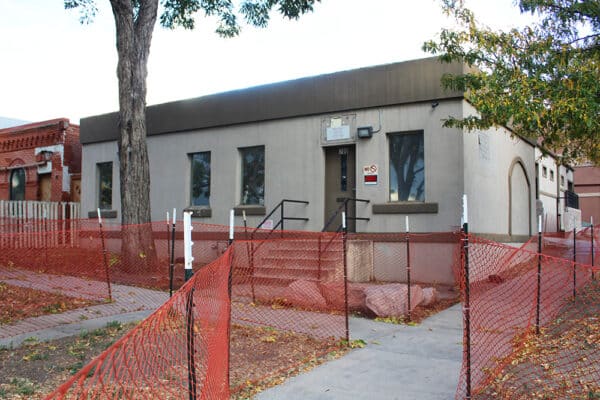
A volunteer serves meals at Haven of Hope in 2016. Denver Post photo.
Business owners in Lincoln Park – exasperated from ubiquitous homeless camps and crime – are wary of a neighborhood homeless nonprofit that aspires to add a small residence in several years.
Haven of Hope opened at 1101 W. 7th Ave. 25 years ago. The organization isn’t a shelter, but a place for homeless people to go for showers, meals and clothes during the day. It also shares information on employment and housing opportunities, and offers services like counseling.
Executive Director Tawnya Trahan said Haven of Hope, which is funded by donors and reported revenue of $2 million in 2021, purchased the 4,000-square-foot building at 700 N. Mariposa St. before the pandemic and applied for a zoning waiver on May 30 to renovate the building into eight individual rooms.
The building would house eight people who then work for the nonprofit as part of their rehabilitation. Trahan said there’s no limit to how long people can live in the building, but it’s meant to be a steppingstone for permanent housing.
But business owners and nearby residents say Lincoln Park is already overwhelmed with homelessness and vagrancy.
An alley of crime
Jared Kleinstein bought three homes in 2021 at 743 through 753 Kalamath St. – about two blocks away from Haven of Hope – to house his media production businesses.

Jared Kleinstein, founder of Fresh Tape Media and Gondola, works in the companies’ office in Lincoln Park. (Maia Luem)
The homes share a gated courtyard and parking lot that face the alley between Lipan and Kalamath Street, but even with the gate, Kleinstein said his employees don’t feel safe after sundown. He said the gate frequently gets kicked in and people camp and openly do drugs in the alley.
“If it’s already this bad, then increasing the unhoused population in our alley can’t really make it much better,” Kleinstein said. “You can only be patient with a company’s mission for so long while it has a direct impact every single day on my team.”
Kleinstein reached out to Haven of Hope this summer to voice his concerns about the housing project. In an email he shared with BusinessDen, Haven of Hope assured Kleinstein the new facility will have 24-hour security.
“You’re admitting you’re building a project that requires additional security for you, and thus our entire neighborhood,” Kleinstein said. “To me, this is not political. This is about employee safety and taking care of my people.”
A fed-up resident
Chuck French, 51, has lived on the same block as Haven of Hope for 12 years. He raised his two daughters there and works from home as a musician. But he said, since the pandemic, crime has spiked.
“It’s pretty (expletive) sketchy,” French said. “I see people doing drugs all the time, find needles on the ground, violence, all kinds of stuff. You name it, it happens. If (Haven of Hope) can’t do anything to help the neighborhood already, what are they going to do if they expand?”
French said he hasn’t had any contact with Haven of Hope, and learned of the housing project only when he was added to a neighborhood email chain. He was aware of one neighborhood meeting Haven of Hope hosted, but said he was out of town.
He said he’d like to see Haven of Hope have employees walk a three-block radius around its property to establish a bigger presence and pick up trash. And he thinks the organization should have a better relationship with Lincoln Park residents.
“We love this house, we love this neighborhood, it’s just that (Haven of Hope) needs to change their MO quite a bit to accommodate whatever changes they want to make,” French said.
Coworking on Kalamath
Mike Arzt bought the 30,000-square-foot building at 621 Kalamath St. 14 years ago to open his coworking company, Battery 621, and his media company, The Public Works.
The business is a five-minute walk from Haven of Hope, and Artz said his tenants and employees frequently deal with car break-ins and vandalism. Artz, 49, acknowledged that Haven of Hope takes care of issues on its own property, but said that just pushes the problem into the neighborhood.
“If they’re not on their property, they don’t have to do anything,” he said. “It’s not very neighborly.”
He loves the neighborhood, but said lately it’s been getting worse; he recently watched the encampment under the Route 6 viaduct go up in flames after a fire spread out of control.
He said he reached out to his councilwoman, Jamie Torres, about his concerns and was quickly connected with others in the neighborhood. He said the community has rallied together, but he hasn’t received any direct communication from Haven of Hope.
“I don’t think Haven of Hope, or the homeless population, is the enemy, but we all have to help each other out,” Artz said. “For me it’s really about making sure the neighborhood is a safe place to live in and do business.”

Haven of Hope bought 700 N. Mariposa St. and hopes to create 8 rooms for homless people as transitional housing.
Haven of Hope’s plan
Executive Director Trahan emphasized the building will not be a shelter, but an extension of services Haven of Hope already offers.
“A lot of what our neighbors think is based on … what an overnight shelter would be like, and that’s not what we will be doing here,” Trahan said.
Shelters typically provide a space to sleep at night only on a first-come, first-serve basis. Trahan said Haven of Hope’s housing would be available only to the same eight registered people until they find a permanent place to live.
“We’ve been here 25 years and what we’re trying to do has actually been getting people off the street,” she said.
Trahan said Haven of Hope clears encampments on its sidewalk but can only call the police when people camp on other streets.
“We really watch and ensure that we don’t have groups congregating on our sidewalks,” Trahan said. “Does that mean they’re staying out of the neighborhood? Absolutely not. (Neighbors) want us patrolling the streets … we don’t have authority to do that. We don’t have the authority to pull someone off someone else’s property.”
As for communication with the neighborhood, she said she’s trying. She said the organization hosted two neighborhood meetings that no one attended, and delivered fliers in a one-block radius around its property. She said she has received emails from a handful of neighbors, but no one has agreed to meet with her to talk about the plans.
She said the zoning waiver application still has to go through its first hearing before it faces a final vote. If it’s approved, Trahan said it’ll likely be at least two years before construction is finished.
